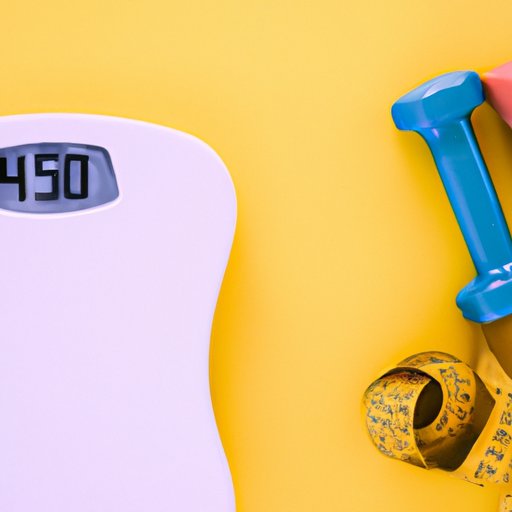
I. Introduction
For many women, the arrival of their period is not just accompanied by cramps and mood swings but also weight gain. But how much weight can you gain on your period, and why does this happen? Understanding the relationship between hormones, bloating, and weight gain during menstruation can help you manage your health and body confidence all month long. In this article, we will explore the common myths surrounding weight gain during your period, provide tips and tricks for managing bloating effectively, and offer suggestions for staying healthy during your menstrual cycle.
II. The Relationship Between Hormones and Weight Gain During Menstruation
Hormonal fluctuations during the menstrual cycle can have a significant impact on a woman’s weight gain during her period. Estrogen and progesterone levels change throughout the menstrual cycle, resulting in fluctuations in water weight, hunger, and metabolism. The menstrual period is typically divided into two main phases: the follicular phase and the luteal phase.
During the follicular phase, estrogen levels rise, which promotes the building of muscle and increases basal metabolic rate. In contrast, during the luteal phase, estrogen levels decrease, and progesterone rises, which can lead to water retention, increased appetite, and sluggish metabolism.
According to experts, it is well-established that women may gain weight during their menstrual period due to the retention of water and other fluids. This retained water can be associated with bloating and significant weight gain, typically peaking around menstruation. However, the exact amount of weight gain varies from woman to woman.
III. Debunking Common Myths About Period Weight Gain
There are many misconceptions surrounding weight gain during a woman’s period. A common myth is that women gain up to five pounds during their menstrual cycle. However, studies indicate that the average weight gain during this time is between one and three pounds. Additionally, the belief that overeating during your menstrual period causes weight gain is also untrue.
It’s important to understand that hormonal fluctuations impact how your body stores and uses energy. Therefore, even if you consume fewer calories during your period, you may still experience physiological weight and bloating that you cannot control.
IV. Understanding Bloating and Its Effect on Weight
Bloating is a common symptom of menstruation and can impact weight gain during your period. Bloating occurs when your body retains fluids and gas in the intestines, resulting in swelling and discomfort.
Experts recommend drinking plenty of water to help flush out your system and reduce bloating. Reducing your intake of salty and processed foods can also help minimize bloating. Consuming foods high in potassium can reduce water retention, and incorporating probiotics into your diet can improve digestion and reduce intestinal inflammation.
V. Tips for Staying Healthy During Your Period
It’s important to maintain a healthy lifestyle during your period to keep your body running smoothly. Drinking plenty of water is crucial in flushing out any retained fluids and preventing water bloat. A balanced, nutrient-rich diet that incorporates healthy fats and protein sources can also be beneficial in reducing inflammation and mitigating period cramps and bloating.
If you experience PMS symptoms, such as acne, mood swings, or fatigue, consuming complex carbohydrates can help regulate blood sugar and reduce these symptoms. Additionally, avoiding caffeine and alcohol can help reduce symptoms and reduce inflammation in the body.
VI. Keeping up a Healthy Exercise Routine
Exercise is an effective way to reduce bloating and counteract the slowed metabolism that can occur during the luteal phase of your menstrual cycle. Experts recommend engaging in gentle exercise, such as yoga, swimming, or walking, to help alleviate menstrual symptoms. These activities can promote relaxation, relieve stress, and reduce bloating.
Incorporating strength training exercises into your routine can also help boost your metabolism and improve body composition. However, if you are experiencing discomfort, it is essential to listen to your body and modify your exercise routine accordingly.

VII. Comparing Weight Gain During Periods to Weight Gain During Other Times
The weight gain associated with menstruation is temporary and can be managed through diet and exercise modifications. In contrast, weight gain associated with overeating during vacations or the holiday season can be more challenging to overcome. According to experts, it can take up to six months to lose the weight gained during these periods of overindulgence.
It’s essential to maintain a healthy lifestyle year-round to avoid rapid weight gain and focus on sustainable, long-term health practices.
VIII. Conclusion
Managing weight gain and bloating during your period can feel overwhelming. However, understanding hormonal fluctuations, common myths, and effective remedies can help put your mind at ease. Remember to focus on balanced nutrition, regular exercise, and positive self-care practices to maintain a healthy body and mind during your menstrual cycle. By staying informed and proactive, you can keep your body feeling its best all month long.




